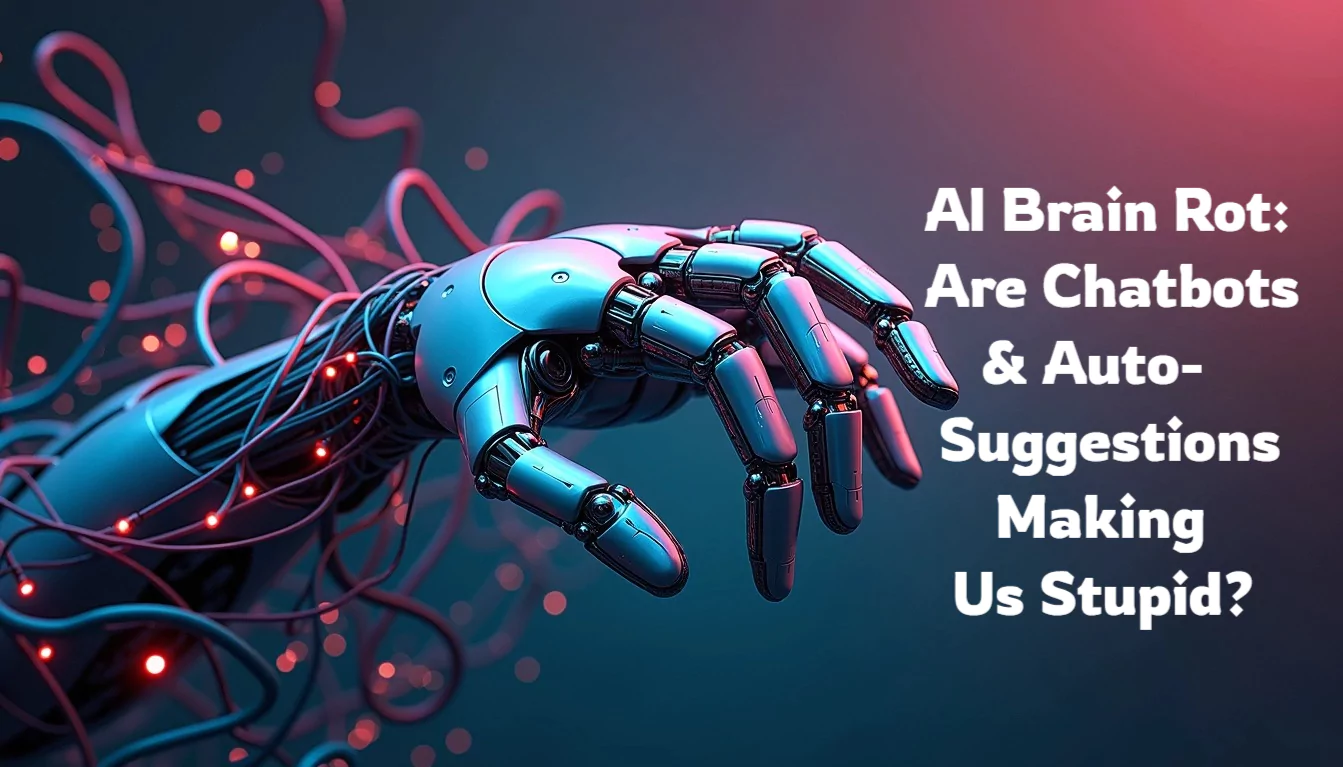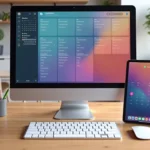The use of chatbots and auto-suggestions has grown a lot. Many people now depend on these tools. They help with tasks like writing, searching, and even small talk. Some say these tools free our minds. Others worry that we lose the spark of true thought. This article looks at the risk of overuse. It shows how our minds may weaken when we lean too much on these tools.
What Is AI Brain Rot?
AI brain rot is a term used to describe the slow loss of sharp thinking. It happens when we use smart tools too much. We let the machine do our work for us. Over time, our own thought skills may decline. We may lose the habit of thinking on our own. This term is not a medical one. It is a way to point out a real worry.
When we ask a chatbot to help us write, we may not work as hard to think through our ideas. Auto-suggestions on our phones and computers can complete our words. They sometimes offer ideas before we even finish our thoughts. This ease may reduce the work our brain has to do. Some experts now wonder if this may lead to a slower or less active mind.
How Chatbots and Auto-Suggestions Work
Chatbots are computer programs that use smart rules and data to chat with us. They learn from vast amounts of text. They then use that knowledge to form replies. The goal is to mimic human conversation. Auto-suggestions work in a similar way. They predict what word you might type next. These systems learn from patterns in many texts.
These tools work fast. They offer help at the drop of a hat. Their replies are based on what they have seen before. They do not create new ideas on their own. They pick what seems to fit best from what they have stored. As a result, they may steer us toward common ideas.
Impact on Memory and Creativity
Memory Loss Through Offloading
Science shows that memory works best when it must work hard. One study asked people to learn a list of words. Some people were given the chance to look up words on a computer. Those who did not look up the words later recalled more. This is known as cognitive offloading. We tend to shift our work to an external tool. When that happens, our brain gets less exercise.
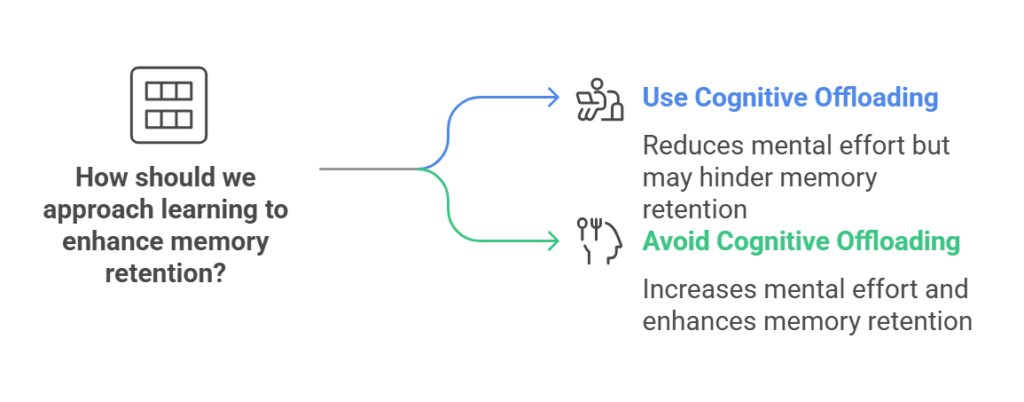
The idea is simple. Our brain is like a muscle. It grows stronger when it works hard. If we let machines do too much, the brain may lose some strength. Data from several studies back this idea. Participants who relied on search tools scored lower on recall tests. They were less able to remember details on their own.
Other tests show a similar result. In one test, participants used auto-suggestions to complete a story. Their final work was less creative than that of people who wrote without help. The machine’s suggestion had set a path that they followed. They did not push the ideas further or add a twist. This loss of depth hints at a drop in creative strength.
Creativity Under Pressure
Many see auto-suggestions as a time saver. They help with spelling and grammar. Yet, creativity often comes from struggle. A rough draft can lead to a gem when we work hard to shape it. If a machine offers a ready-made idea, the mind may settle too quickly. This may lead to bland or common work.
Studies in creativity have shown that a bit of struggle helps us form new ideas. When we think hard, our brains search through past knowledge and mix it in new ways. This blend often sparks a unique thought. When we use smart tools too much, our brain may miss this chance. It may settle on a reply that is safe and plain.
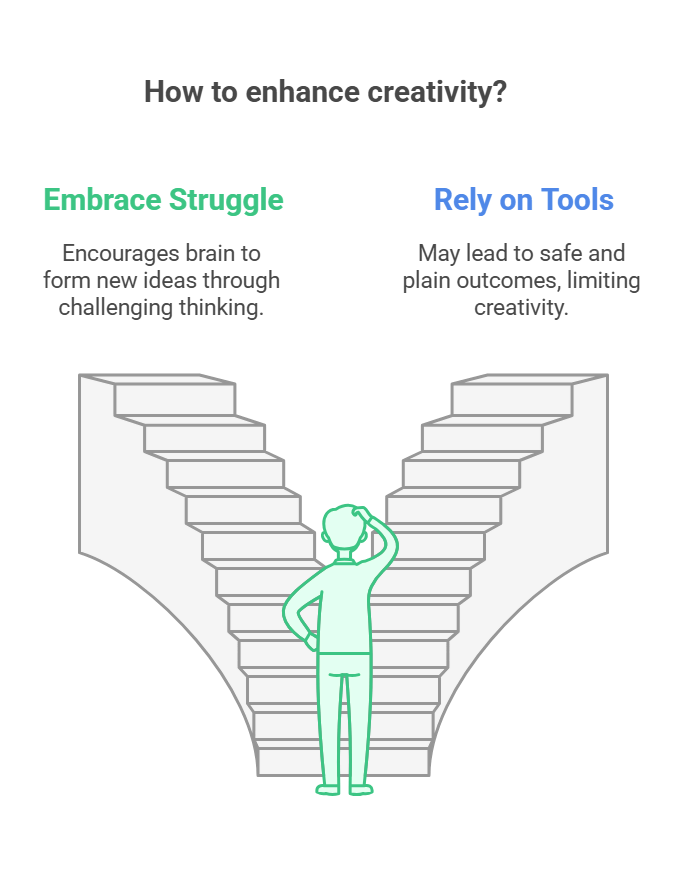
A test in a college class showed that students who used smart assistants often gave similar answers. They rarely offered a twist or original view. In contrast, those who worked on their own offered more varied ideas. Their work had more signs of deep thought. This finding hints at a risk. If we use chatbots and auto-suggestions too much, we might lose the chance to shine with our own ideas.
Scientific Evidence of Cognitive Offloading
Evidence from Memory Tests
Research has shown that when people know an answer is a click away, they work less to store details in their memory. In one study, subjects who were told that answers were saved online recalled fewer details later. This effect is known as cognitive offloading.
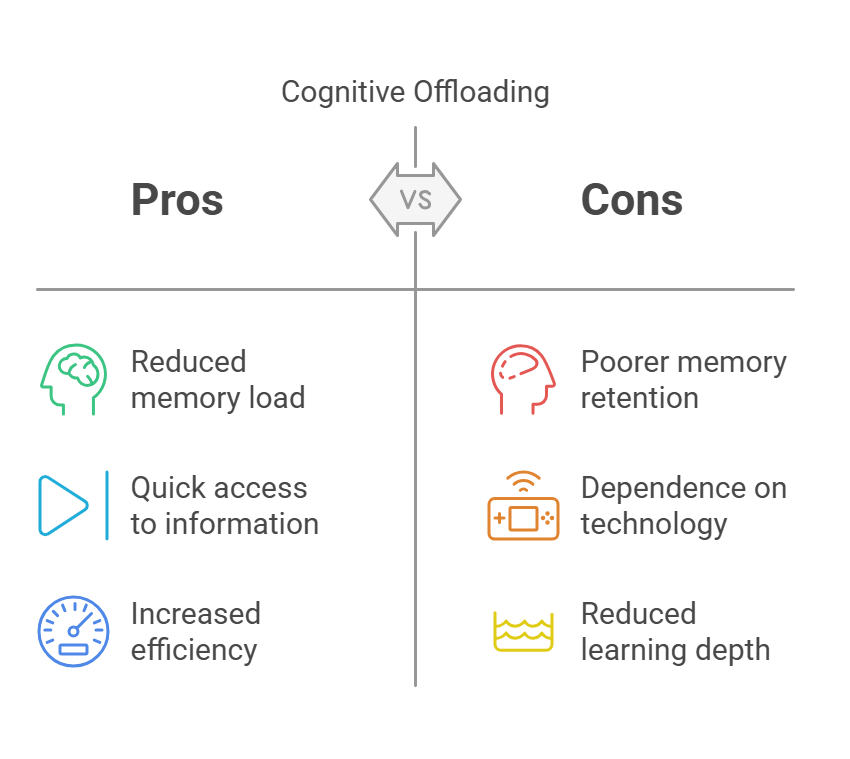
- Observation: Relying on a machine to do mental work can reduce our own effort in remembering.
- Conclusion: A strong memory builds when the brain is exercised by self-reliance.
Data That Speaks Up
Many tests back the worry of AI brain rot. A test from 2011 showed that when people rely on the internet, they recall less. In one test, participants were told that answers were stored online. Their memory of details was lower than those who were not given this option. The study gave a clear sign that offloading can weaken our recall.
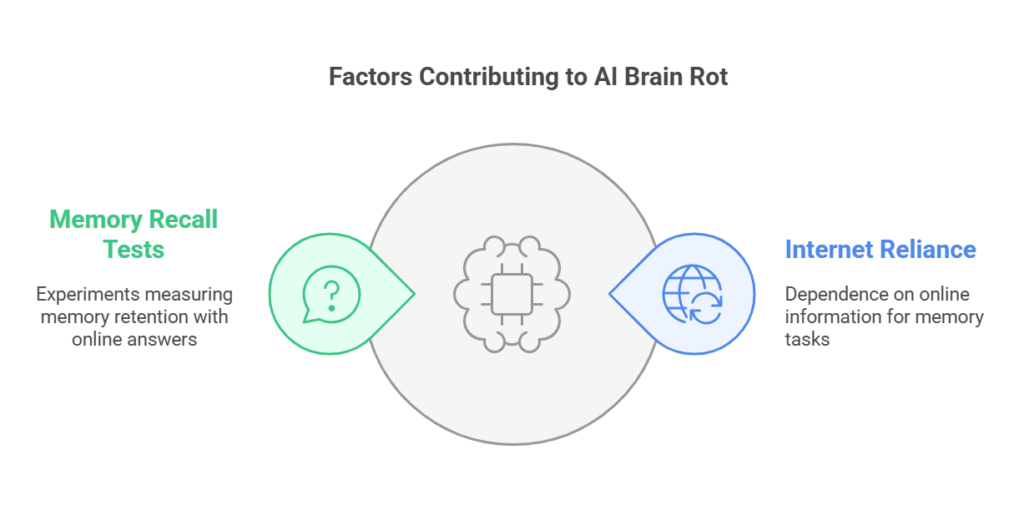
In another study, students were asked to write essays. One group had help from auto-suggestions. The other group did not. The essays from the group with help were less varied. They repeated common phrases. The group that worked without help offered more new ideas. Their work showed more personal thought.
Yet another study looked at how people solve puzzles. One group had hints from a smart tool. They solved the puzzles with ease. However, when later tested, their skill in solving new puzzles was lower. They had grown used to the hints. This change shows that our minds may lose strength if we do not work hard.
Effects on Daily Communication
Our daily chats and emails are now often touched by AI. Smart tools help with grammar and word choice. They work in many languages and on many devices. Their help is welcome in a busy day. But a heavy use of these tools may also change the way we speak and write.
The Effect on Writing
Our writing and speech are forms of art and skill. They come from our own thoughts. When we use auto-suggestions, we may follow a set path. The words that come may not show our true voice. Over time, this can change our style. Our words may start to sound the same, not just for one person but for many.

Teachers have noted that students who rely on auto-suggestions often write in a plain tone. Their essays may lack a clear, personal feel. Instead, they seem to echo what the tool suggests. This makes it hard to spot the writer’s own thought. Some worry that this trend will affect not just school work, but all writing. A loss of style is a loss of self.
The Effect on Speech
Speech can suffer in the same way. When a phone suggests a reply, you may choose it without much thought. Over time, your speech may rely on common phrases. This habit can affect conversations at home or at work. The art of choosing the right word may fade. Data from surveys show that many people feel their speech has grown plain. They miss the days when each person had a unique tone.

Social Media Influence
Smart tools are not just used in private tasks. They are also common in social media. Many posts, comments, and tweets now get a boost from auto-suggestions. When many people use the same tool, the words start to look alike. This can lead to a type of group thought.

When ideas are formed from the same set of suggestions, fresh views may be rare. A study of social media posts found that many shared the same phrases. This sameness makes it hard to see a true voice. People may not feel the need to think hard when a tool gives them a ready phrase. The result is a flood of common ideas. This drop in variety may hurt debate and learning.
How Reliance May Change Our Brain
Some scientists study how the brain changes when it is not used to its full strength. They use brain scans to see which areas work hard. In tests, people who offload tasks show less activity in areas linked to memory and thought. Their brains do not light up as much when they solve a problem on their own.
These tests show a clear link. When the brain is not exercised, its strength may drop. The change is gradual but real. Data from brain scans confirm that a tool can change the way our brain works. The message is clear. When we do not use our brain fully, it may not keep its best shape.
The science behind this is strong. Many labs have repeated these tests. The results hold true in many settings. They show that our minds are like muscles. They must work hard to stay fit. If we let a tool do the work, we lose some strength. This is not a myth. It is a fact that comes from careful study.
What Can You Do to Keep Your Mind Active?
While smart tools can help, you can also take steps to strengthen your own mind. Challenge yourself to work without a tool every now and then. Here are some steps you can take:
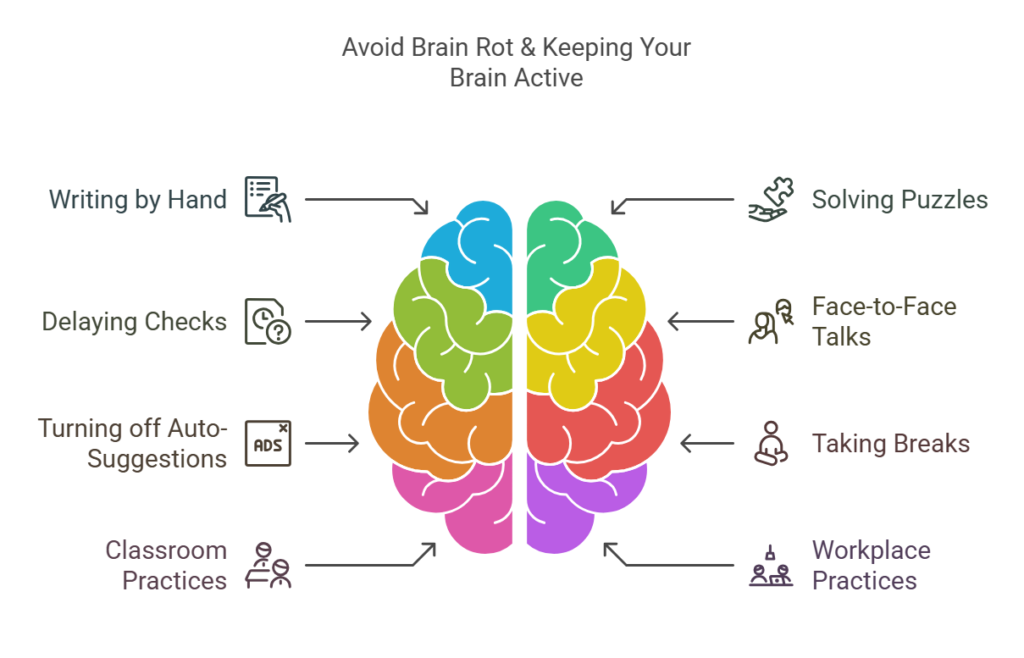
- Write by Hand: One simple step is to write a journal by hand. This act forces you to form your own thoughts. You can then compare your writing with what a tool might have suggested. This can show you the difference between your own ideas and common ones. Over time, this habit may keep your mind strong.
- Solve Puzzles: Another step is to set aside time for puzzles or games. Puzzles make your brain work hard. They force you to build new links. Many puzzles help you think in new ways. Over time, this practice can help keep your brain fit. Experts say that even a few minutes each day can help.
- Delay the Check: Try to ask yourself questions before you check a phone or a computer. Give your mind time to find an answer. It is a small step that may build your skill over time. You may find that you start to trust your own thoughts more. This small habit can make a big change.
- Face-to-Face Talks: Engage in conversations without texting. A good practice is to talk with friends face to face. This mode of talk forces you to listen and speak without hints. Face-to-face talk is a great way to keep your mind alert. It also builds social skills that auto-suggestions cannot offer. Many find that these real talks spark new ideas.
- Turn off Auto-Suggestions: Try to start a new habit today. Turn off the auto-suggestions when you write a note. Write a short story by yourself. Let your ideas flow from your own mind first. Only later can you check for errors with a tool. This habit may seem small at first. But it builds strength in your brain over time.
- Take Breaks Without Phone: Another step is to spend time away from screens. A walk or a quiet time with a book can help your mind rest and work on its own. These breaks may seem small, but they add up. Many people report feeling more alert after a break from smart tools. The key is to build a habit of work without help.
- In Classrooms: Many teachers see the risk of heavy reliance on auto-suggestions. Some now ask students to write first drafts by hand. Others limit the use of smart tools during tests.
- In the Workplace: Some companies now set aside times when employees must work without a phone or computer. These periods help staff think independently. The results often include more unique solutions and a stronger overall team performance.
- Pause & Ask: A careful look at your own habits can help you see if you are giving too much ground to machines. Notice when a suggestion comes in and if you choose it without thought. Try to pause. Ask yourself if you can form your own reply. This small act can help rebuild strong thought links in your mind.
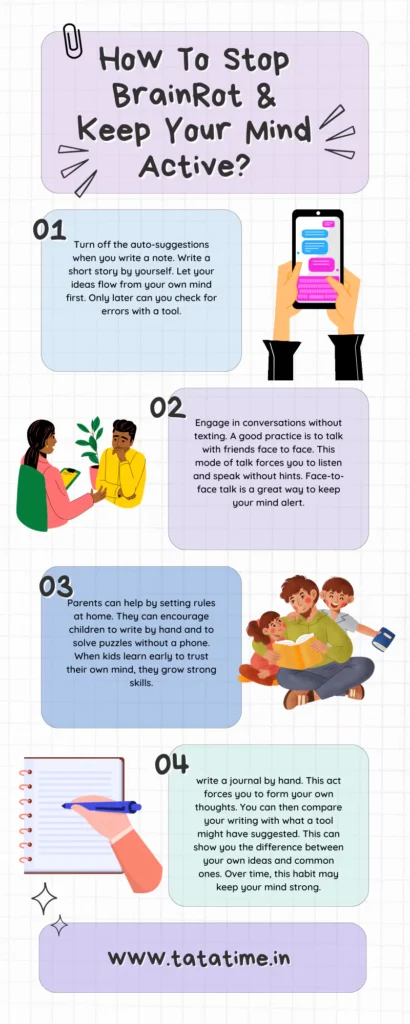
The Way Forward
Our tools are here to help us. They fix small errors and speed up work. Yet, we must use them with care. The choice is ours. We can use them for routine tasks. But we should also challenge ourselves to work on our own.
A balanced life is one where the mind is both aided and challenged. We must find times to think hard. We must set aside moments where no tool is allowed. A simple routine can help. For instance, try to write a note by hand each day. Think through a math problem without a calculator. These small acts keep the brain in shape.
We can also share our ideas with friends. A talk that flows from your own thoughts is a sign of a healthy mind. In group work, share ideas that are yours. Let the tool serve as a helper, not a boss. This way, you keep your own style and skill intact.
The key is to be mindful of your habits. Ask yourself if a tool is a help or a crutch. When you catch yourself relying too much, pause and think. It is a simple check that can make a big difference. Many who have done so say they feel more in charge of their own thought.
Study & Reference Links
Sparrow, B., Liu, J., & Wegner, D. M. (2011). Google Effects on Memory: Cognitive Consequences of Having Information at Our Fingertips. Science, 333(6043), 776–778.
Link: https://doi.org/10.1126/science.1207745
This seminal study shows that when people believe information will be available later online, they tend to remember less of the information itself but better where to find it.
Risko, E. F., & Gilbert, S. J. (2016). Cognitive Offloading. Trends in Cognitive Sciences, 20(9), 676–688.
Link: https://doi.org/10.1016/j.tics.2016.07.002
This review explains how relying on external tools for tasks like memory retrieval can reduce the work done by our own cognitive systems.
Google Effect (Digital Amnesia) – Wikipedia.
Link: https://en.wikipedia.org/wiki/Google_effect
An overview of the phenomenon where people tend to forget information that they know can be easily found online.
Varshney, L. R. (2012). The Google Effect in Doctoral Theses. Scientometrics.
(Search for “Varshney 2012 The Google effect in doctoral theses” to locate this study or its DOI.)
This study proposes that increased referencing in theses may indicate that scholars remember where to find information rather than the details themselves.
Dong, G., & Potenza, M. N. (2015). Behavioural and Brain Responses Related to Internet Search and Memory. European Journal of Neuroscience.
(Use the title and authors’ names to search for the article in an academic database; many such articles have DOIs available.)
This work examines how Internet search behaviors impact memory and associated brain activations.
Rowlands, I., Nicholas, D., Williams, P., Huntington, P., & Fieldhouse, M. (2008). The Google Generation: The Information Behaviour of the Researcher of the Future. ASLIB Proceedings, 60(4), 290–310.
Link: https://doi.org/10.1108/00012530810887953
This paper discusses how modern researchers rely on the Internet for information retrieval—a foundation for understanding transactive memory.
Huebner, B. (2016). Transactive Memory Reconstructed: Rethinking Wegner’s Research Program. The Southern Journal of Philosophy.
(A search by title and author should help locate this paper; it provides a critical look at the idea of computers as partners in memory.)
Camerer, C. F., Dreber, A., Holzmeister, F., Ho, T.-H., & Huber, J. (2018). Evaluating the Replicability of Social Science Experiments in Nature and Science Between 2010 and 2015. Nature Human Behaviour, 2, 637–644.
Link: https://doi.org/10.1038/s41562-018-0399-8
This large-scale replication study (among others) attempted to replicate experiments including the Google effect, offering insight into the robustness of the original findings.
Henkel, L. A. (2014). Point-and-Shoot Memories: The Influence of Taking Photos on Memory for a Museum Tour. Psychological Science, 25(2), 396–402.
Link: https://doi.org/10.1177/0956797613504438
Although focusing on a related phenomenon—the photo-taking impairment effect—this study contributes to the broader discussion on how technology changes memory.
Krieger, L. M. (2011, July 16). Google is changing your brain, study says, and don’t you forget it. San Jose Mercury News.
(This news article discusses the implications of the Google effect as reported by Sparrow et al. and can be found via a web search.)

